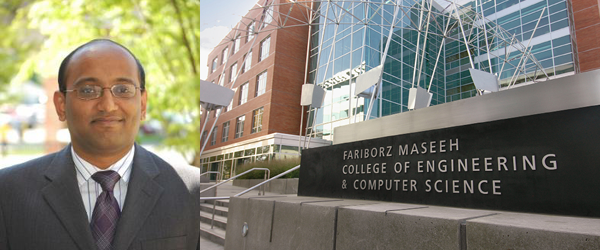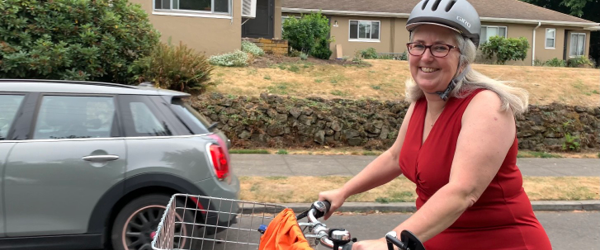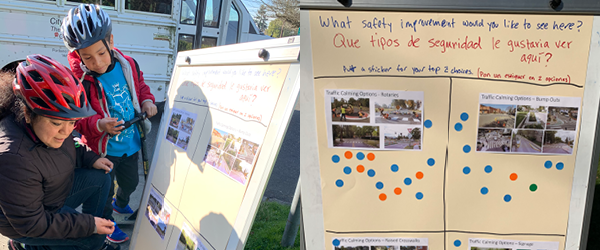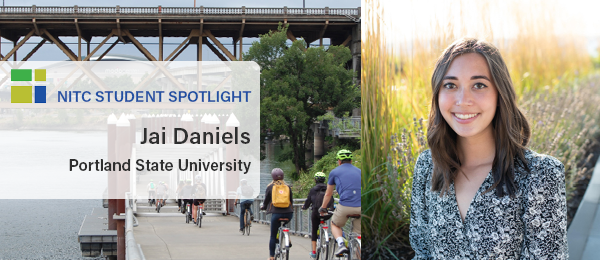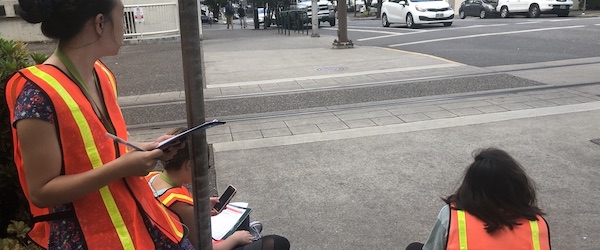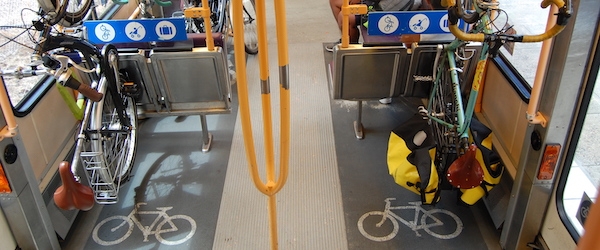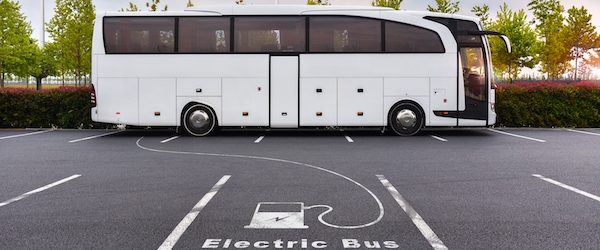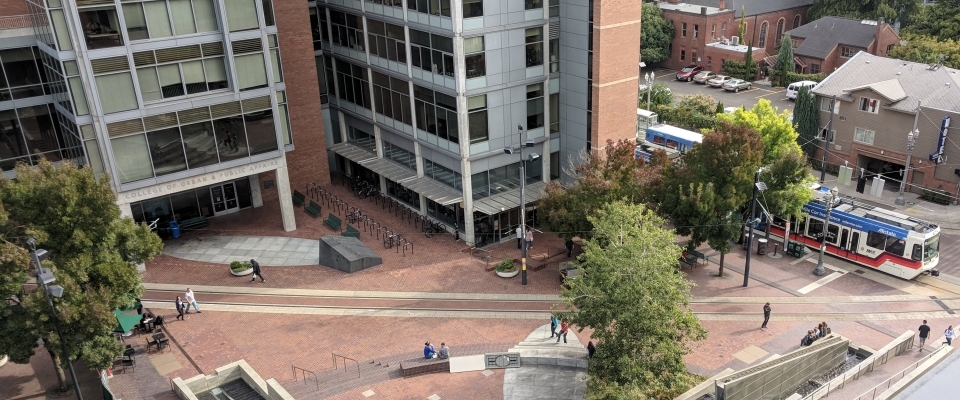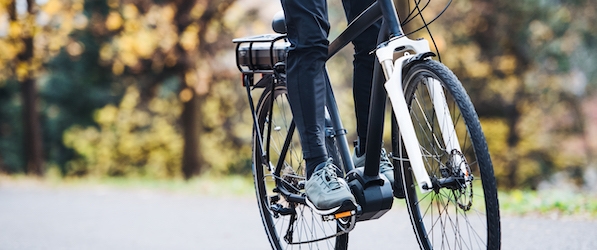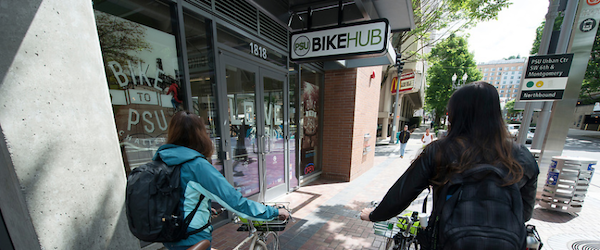Congratulations to Avinash Unnikrishnan of Portland State University's Department of Civil and Environmental Engineering, for his 2021 promotion from associate professor to full professor!
Avi is a David Wedge Vision Professor of Civil and Environmental Engineering at the Maseeh College of Engineering & Computer Science at Portland State University. Dr. Unnikrishnan's research focuses on enhancing system efficiency and resiliency via the development of novel mathematical models based on the application of large-scale optimization, machine learning, data mining, and simulation tools. His work's primary innovation is in the representation of network uncertainty, robustness, user behavior, and complex system interaction in civil infrastructure networks. Dr. Unnikrishnan is the chair of the Transit, Freight, and Logistics Subcommittee (AEP40(1)) of the Transportation Network Modeling Committee of the Transportation Research Board. He is also a member of the Freight and Logistics Committee of the American Society of Civil Engineers.
Website | LinkedIn | PSU Profile | Researcher Profile
With funding from ...
Read moreSee the full, original article "PSU Announces Recipients of Prestigious University Research and Mentoring Awards", authored by Shaun McGillis, Research and Graduate Studies, PSU. Below is an excerpt:
Portland State University announces the 2021 awards for excellence for research, graduate mentoring and research administration. The awards are among the university's highest honors. They recognize and incentivize PSU faculty and staff excellence in research, scholarship, artistry and dedication to PSU students.
Recipients of the awards are some of the most dynamic faculty and staff members at PSU. Colleagues submit nominations; a jury of peers selects awardees based on the significance and quality of their research or creative achievements and extraordinary commitment to creating an environment supportive of research and student success. Join us as we celebrate this year’s awardees at the Research Awards Ceremony (online Friday, 3:30 - 5 PM Pacific) during...
Read moreSince 2013, local transportation activist group Better Block PDX has developed partnerships with organizations across the Portland Metro area. Most notable were the connections that emerged between the communities’ needs for creative transportation solutions and the expertise of Portland State University (PSU) transportation students.
That collaboration evolved into Better Block PSU, a pathway program led by PSU’s Transportation Research and Education Center that integrates tactical urbanism and placemaking into the engineering and planning curriculum at PSU. Most recently we shared an update on Re-Imagining a Safer Route to the César Chávez School, which advanced to the Spring 2021 engineering capstone.
We’re excited to announce the latest projects to have been accepted into the Better Block PSU pathway program:
- City of Independence Neighborhood Greenways: This project will help create a low-stress biking and walking network through Independence connecting local schools, businesses, and parks.
- Community Green Space for Parkrose: This project plans to create a pathway from the Parkrose neighborhood to the Columbia Slough to increase access to green space and community knowledge of the Slough.
- Arleta Triangle Transformation...
Jai Daniels is a first-year Master of Urban and Regional Planning (MURP) student at Portland State University, currently working with PSU's Transportation Research and Education Center (TREC) as a Graduate Research Assistant under faculty advisor John MacArthur. She is interested in urban livability, bicycle and pedestrian planning, transit planning, and the intersection between urban planning and the environment.
Tell us about yourself?
I grew up in a small town in North Carolina, often referred to as 'Mayberry.' Living near the Blue Ridge Parkway and not having much to do, apart from spending time outside, largely influenced both my passion for environmental conservation and my desire to travel. This in turn influenced what I chose to study. I graduated from the University of North Carolina at Chapel Hill in 2019 with a degree in environmental studies and minor in city and regional planning. Now, I live in Portland and am in my first year of the Master of Urban and Regional Planning program at Portland State University. Outside of school, I enjoy listening to podcasts, watching movies, taking film pictures, and hiking.
What (or who) has influenced your career path in transportation?
As an undergraduate student, I studied abroad in Copenhagen, Denmark, which sparked my...
Read moreWe've just published a brand new set of four "How Walkable is Your Neighborhood?" education modules for high school students (download here)!
The modules, which can be taught in sequence or as standalone lessons, provide students with creative ways of observing transportation systems in their neighborhoods through collecting pedestrian data, critically evaluating accessibility, and learning about livable communities. Students will gain a deeper understanding of how people move through their community, and whether the transportation in their community is designed with the needs of all people in mind.
This curriculum was originally developed for the National Summer Transportation Institute (NSTI) - a STEM-focused transportation summer camp for high school students. In 2020, when the camps were converted to a virtual format for the first time, new tools had to be developed for student engagement and learning. These walkability modules were completed during the virtual camps, but are not dependent on a...
Read moreIn June 2019, the City of Portland Bureau of Transportation (PBOT) launched a new incentive package aimed at making transportation more accessible for low-income households. In the "Transportation Wallet for Residents of Affordable Housing" pilot program, people living in affordable housing developments received access to free transportation options like transit passes, bike or scooter share memberships, rideshare and carshare credits.
Portland State University researchers evaluated the pilot program to find out how participants used the Transportation Wallet and how it helped them use different transport modes to get around.
A February 2021 paper in Transportation Research Record by Huijun Tan, Nathan McNeil, John MacArthur and Kelly Rodgers presents insights into the implementation and effectiveness of a transportation financial incentive program for low-income populations. Access the paper: "Evaluation of a Transportation Incentive Program for Affordable Housing Residents."
Main findings include:
- The financial support of this program encouraged some participants to use new mobility services (including Uber/Lyft, bike share, and e-scooter) that they had never used before.
- The program increased access for participants, helping them make more trips and, for some, get to places they otherwise could not have gone.
- Transportation fairs, where...
Led by Xiaoyue Cathy Liu of the University of Utah (UU) and funded by the National Institute for Transportation and Communities, researchers have created a web-based modeling tool (see GitHub repository built for the Utah Transit Authority) that enables U.S. transit providers to explore the impacts of changing over their systems to electric buses*. The researchers ran the model for TriMet in Portland, OR as well, with TriMet results and analysis presented in the final report (PDF).
"The interactive visualization platform lets users explore various electric bus deployment budget scenarios, so that transit agencies can plan the most cost-effective way to transition their fleet from diesel to electric buses – while prioritizing disadvantaged populations," Liu said.
The research team, at University of Utah, Portland State University (PSU), and University of California, Riverside, set out to answer three questions:
- What costs and benefits are associated...
The 2021 Spring term at Portland State University starts March 29, and since it's all online this term for everyone - Why not take a class? You don't have to be a current PSU student, or even live in Portland.
Below are Spring 2021 transportation graduate courses. Students can register online; if you are not a current PSU graduate student, you can still take these courses through the non-degree application process or as a post-baccalaureate student. Taking a course is one way to see if one of our PSU graduate degree programs is right for you!
Civil and Environmental Engineering*
*Non-degree or non-PSU students should contact the Civil Engineering Academic Program Manager in order to register for a CEE course, as the system requires an approval to process the registration.
CE 410/510 New & Emerging Technologies in Transportation
Instructor: John MacArthur
Citing two TREC studies, Congressman Jimmy Panetta of the 20th District of California and Congressional Bike Caucus Chairman Earl Blumenauer of Oregon have introduced the Electric Bicycle Incentive Kickstart for the Environment (E-BIKE) Act to encourage the use of electric bicycles, or e-bikes.
The E-BIKE Act creates a consumer tax credit that:
- Covers 30% of the cost of the electric bicycle, up to a $1,500 credit
- Applies to new electric bicycles that cost less than $8,000
- Is fully refundable, allowing lower-income workers to claim the credit
The first TREC study referenced, The E-Bike Potential: How E-Bikes Can Improve Sustainable Transportation, found that if 15% of car trips were made by e-bike, carbon emissions would drop by 12%. This finding was based on a Portland, Oregon case study. The researchers also created an Electric Vehicle Incentive Cost and Impact Tool which enables policymakers, public stakeholders, and advocates to quickly visualize the potential outcomes of...
Read moreThe Portland State University Bike Hub has received funding to purchase 25 electric bikes via a new grant from Portland General Electric.
The Bike Hub is a full-service retail bike shop on campus, opened in 2010. The shop offers long-term bike rental through its VikeBike program, a fleet of over 140 bikes offered at low cost (or no cost, based on need). The program’s existing fleet was assembled by collecting and refurbishing abandoned bikes on campus and made available to students for long-term rentals.
PSU will use this funding to purchase 25 Batch Bicycles e-bikes, to supplement the rental fleet and provide greater access to those living further from campus or those with physical barriers to cycling, and serve as a pilot program toward the eventual full replacement of the rental fleet with e-bikes.
Read more about the PGE program on BikePortland, or read about TREC research focusing on e-bikes.
Photo by Edis Jurcys
The Transportation Research and Education Center (TREC) at Portland State University is home to the National Institute for Transportation and Communities (NITC), the Initiative for Bicycle and Pedestrian Innovation (IBPI), and other transportation...
Read more
